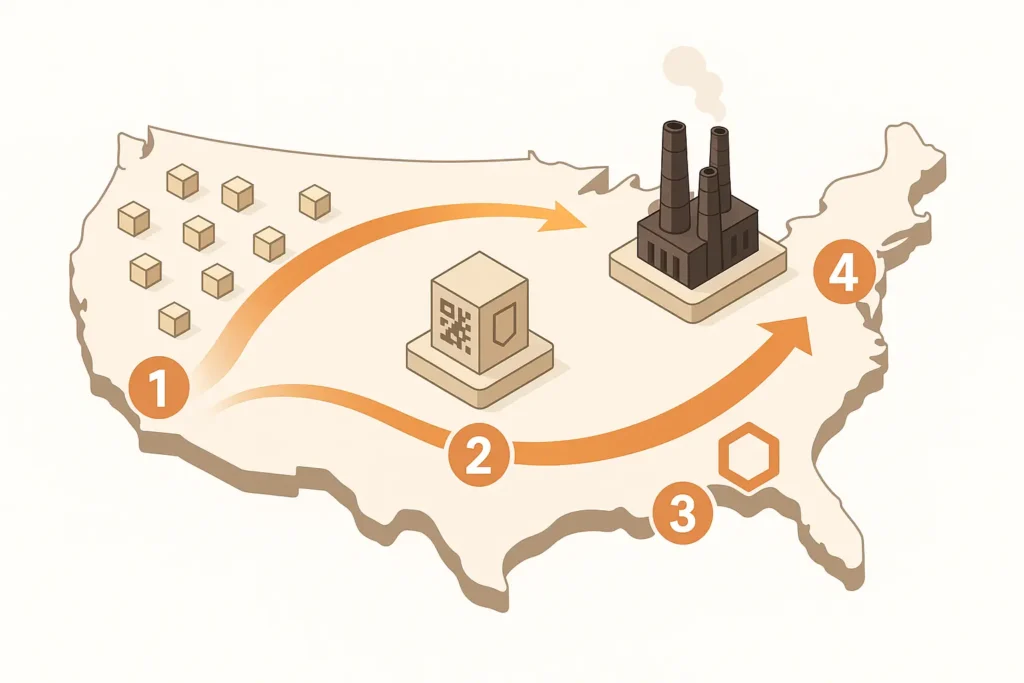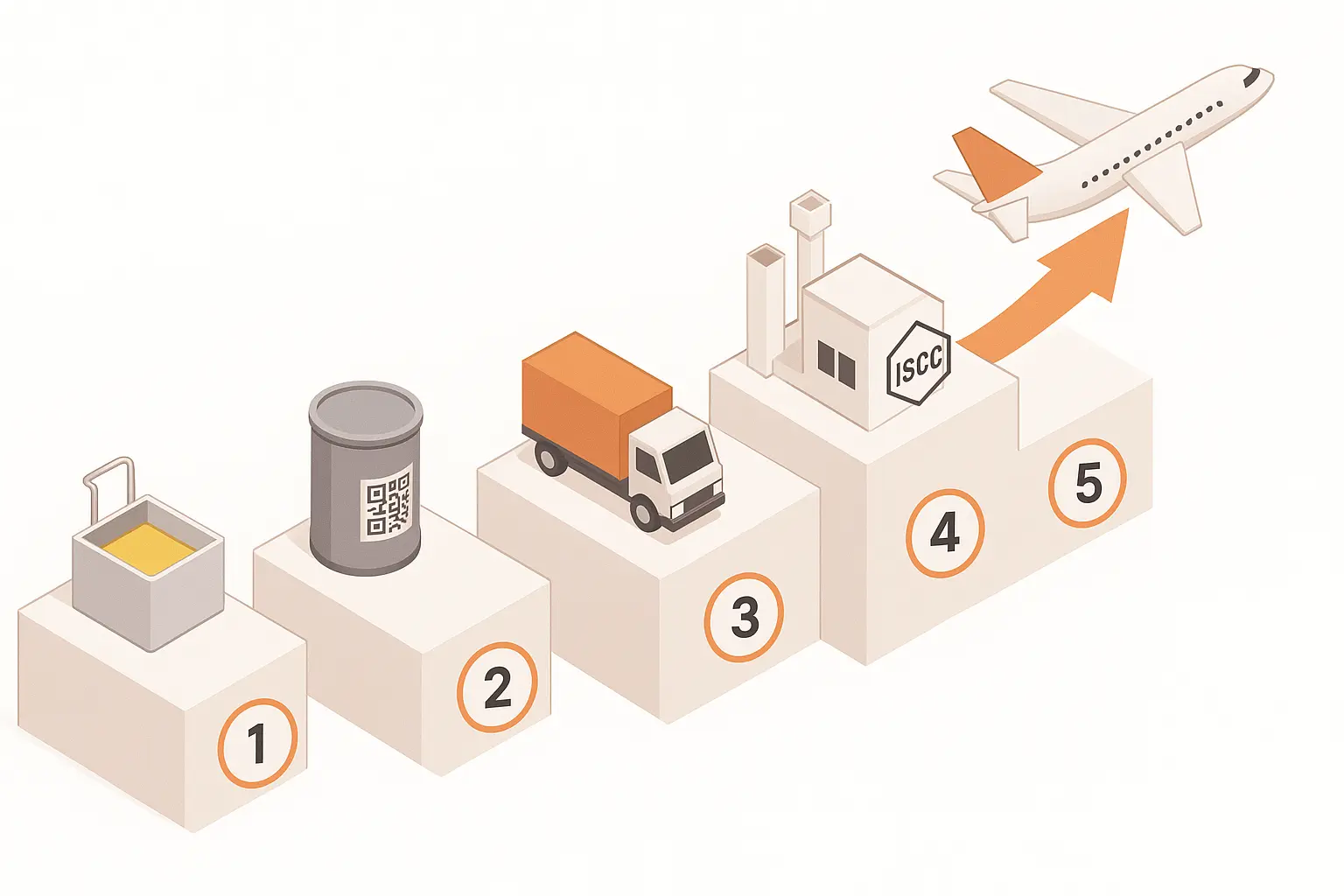Table of Contents
Why SAF Depends on Rock Solid UCO Traceability
SAF made from waste oil sells for double the price of diesel and fraudsters know it. EU regulators estimated 1.8 million t of mislabeled biofuel in 2023 and even debated suspending ISCC approvals. Grease Connections saw the same pressure at street level: one Miami client lost a week’s worth of grease to siphoning before we installed color change bolt seals. Since that switch, recorded volumes now match fryer capacity within 2 percent (Grease Connections internal log, 2025). Airlines tell us they pay premiums only when every gallon is documented; EPA’s RFS forces processors to link batch numbers to RINs or forfeit credits. Traceability isn’t paperwork it’s money.
Mapping the Journey: Kitchen to Biorefinery
A dependable chain of custody tags each load “one step back, one step forward,” a GS1 principle designed for recalls. At Grease Connections, the tag is a weather proof GS1 Digital Link QR on every steel uco container. Kitchen staff scan during clean out; our driver scans again at pickup, capturing net weight from an onboard legal for trade scale calibrated under NIST Handbook 44 tolerances.
The ledger travels with the tanker to a processor, then on to a SAF refinery. Miss one scan and the whole lot reverts to road diesel pricing a lesson we learned the hard way in 2024 when a single unreadable label cost a Florida customer $80 in lost credits (Grease Connections service ticket #1432).

Technology Toolbox: How We Sealed the Gaps
Tamper evident bolt seals rated for cable cutters, not pocketknives stop mid route siphoning. Each drum lid carries that QR plus a Bluetooth temperature probe; sudden heat spikes flag water dilution. When the bin is emptied, a smart scale logs gross and tare weights straight to a Hyperledger Fabric node, echoing Bioledger’s 1.9 million liter pilot for RSB. On our Tampa pilot, drivers shaved nine minutes per stop by ditching paper tickets, and weight discrepancies dropped below 1 percent (Grease Connections internal log, 2025).
Field Note – Tampa, FL (May 2025): “If the blockchain node is down, the bin doesn’t move.” — Jorge A., Grease Connections Co Founder.
Table 1. Certification Snapshot
| Standard | Covers | Who Needs It | Key Proof Point |
|---|---|---|---|
| ISCC EU | Waste oils & residues | Collectors, processors | Mass balance records |
| ISCC CORSIA | SAF exporters | Processors, traders | ICAO sustainability criteria |
| RFS/RINs | U.S. market | Processors, refiners | Batch IDs for D codes |
Certification Stack: Making Auditors Smile
Under ICAO’s CORSIA, only fuel from an approved Sustainability Certification company counts toward airlines’ CO₂ ledgers. Grease Connections aligns early: one barcode follows a load from Orlando to Miami, so an ISCC auditor can reconcile mass balance in minutes. When we shipped our first ISCC and CORSIA ready lot in March 2025, the refinery buyer added a 3 cent per pound premium “for paperwork we can trust” (client email on file). Circularise’s analysis shows why: oversupply of dubious certificates depresses markets unless proof is ironclad.
Data Hygiene: Turning Logs into Bankable Proof
ICAO urges monthly reconciliation between blockchain logs and ISCC statements to catch double issuance. Our dashboard flags any pickup weight 30 percent above fryer capacity; six alerts in 2024 uncovered a cracked sensor, not fraud. EPA e RIN files reject mismatched timestamps, so our system syncs scale clocks nightly.
Table 2. Micro Case Study Miami Airport SAF Corridor
| Problem | Grease Connections Fix | Result |
|---|---|---|
| Audit found 18 % weight gap | Added NIST calibrated truck scale & GS1 QR | Passed ISCC spot check; won 3 year SAF contract |
ROI: Commanding Top Dollar for Verified Liters
Grease Connections reports UCO prices topping 50 ¢/lb in 2024 as SAF demand rises. Spot buyers pay even more for lots with full life cycle data; ResourceWise warns uncertified imports are flooding the U.S. and depressing margins. Our Houston refinery partner now offers a separate line item “Proof as a Service” worth up to 4 ¢/lb when blockchain hashes accompany each batch (agreement #GC SAF 009, 2025). In plain English: better paperwork, bigger paycheck.
30 Day Action Blueprint
- Week 1: Install lockable bins and print GS1 labels.
- Week 2: Train kitchen staff to scan QR codes at every clean out; schedule nightly pickups.
- Week 3: Connect truck scales to the blockchain node; run a mock audit.
- Week 4: File for ISCC registration and align your first outbound load with an EPA approved processor.
Operated in South Florida? See our Miami used cooking oil collection page for on site support.
Next Steps with Grease Connections
We equip restaurants in the east coast of United States with sealed bins, blockchain scales, and ISCC onboarding. Book a free traceability consult, and we’ll map your fryer to flight pathway in under an hour. Because we don’t just talk traceability we haul it every night.









